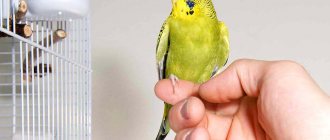- home
- Rat
- Care
06/24/2019 Domestic rats are simple pets that do not cause many problems if well kept and given proper attention from the owner. Healthy rodents are not aggressive and friendly. Therefore, if a rat bites you, you don’t immediately panic – perhaps this is an isolated incident that occurred due to a number of specific reasons. If your pet bites often, you need to find out what motivates this action and what to do.
Do house rats bite?
These are affectionate, kind animals. They are loving, adore their owner and show a positive attitude in every possible way. However, it happens that a pet suddenly bites.
It is worth noting that the bite of a decorative rat is very painful and quite strong, reaching 500 kg per 1 cm². The bite force allows wild brethren to gnaw concrete in search of food.
As a rule, a light, warning bite follows first.
A rat bitten until it bled: first aid
The wound is usually deep, very painful and has difficulty healing. In this case, the edges are quickly tightened, which prevents blood from escaping, which could have become infected.
Algorithm of actions:
- First of all, squeeze out as much blood as possible from the wound to eliminate the presence of dirt.
- Rinse under running water for at least 5 minutes.
- Then treat the bite site with any antiseptic: hydrogen peroxide, chlorhexidine, a weak solution of potassium permanganate.
- Apply iodine or brilliant green to the wound.
- If necessary, cover with adhesive tape.
- Monitor your health for a few days. And do all household chores with gloves.
Wound treatment is the same for adults and children.
It is of great importance that the pet is truly domestic, vaccinated and kept in good conditions.
If a rat bites a child, be sure to talk to the child and explain how to handle the pet. The bite could occur after the animal was squeezed too hard, hurt or scared. The main thing is to explain to the child that the rat must be handled carefully and then it will not cause trouble.
We turn to professionals
Our company professionally deals with the deratization and extermination of rats in Moscow and the Moscow region and the prevention of their occurrence. Before starting work, we carefully inspect basements, ground floors, adjacent areas, and, if necessary, roofs and attics of apartment buildings.
In our work we use special preparations that we spray using hot and cold fog, as well as using smoke bombs. When using them in the basement, we must notify all residents of the house. All necessary licenses and sanitary documents are available. Contact us to get rid of an unpleasant neighborhood.
Other causes of bites
A completely understandable desire to dominate, inherent in an animal by nature itself. As a rule, young animals who want to establish a hierarchy express themselves with the help of bites. For them, biting means a way to assert themselves, test the “strength” of their fellow creatures, and challenge others, including humans. There is no need to use any physical action for this behavior; it is enough to continue to communicate calmly, and you can switch the animal’s attention to a game or a treat.
A bite can be a completely logical response to a stressed animal. When he feels danger and is afraid, he can begin to act according to the principle: “the best defense is an attack.” Unexpected loud noises, such as neighbor's renovations or street fireworks, can also frighten the animal. True, a similar reaction may also occur to insufficiently good conditions of detention.
Everything new, at a minimum, is alarming for the pet - whether it’s a new owner or moving to a new house, the rat will need some time to get used to it and get comfortable. Until then, she will be frightened by unfamiliar smells and surroundings. By the way, if the owner has to come into contact with other animals, then after this it is worth washing their hands thoroughly to remove their odors and not cause unnecessary anxiety to the rat.
If a rat has been mistreated, neglected and abused, it can become not only fearful, but also aggressive. The consequence of both may be the desire to bite. Although excessive attention can also do a disservice. If a rat is endlessly carried in your arms, squeezed and tormented with hugs, then it can give a warning bite, indicating that it is better to leave it alone.
The desire to bite can be a signal of a pet's bad mood or represent a character trait. A rat can share territory with a cage neighbor, of course, with the help of bites to show “who is stronger here.” She can bite a brother, and become jealous of his owner, for example. It is noteworthy that rats, just like people, have completely different characters. There are animals that do not bite in principle, and there are also those that react this way to any stimulus.
Decorative rats can also bite because they are hungry. You should always give your pet food on time, and wash your hands after preparing food so that they don’t smell like food, which can confuse a curious little animal.
When experiencing pain or discomfort, your pet may become restless and even bite. Although the malaise may not be expressed outwardly. Therefore, if you notice that your animal is behaving unusually, you should consult a veterinarian.
Redirected aggression
If two rats divide spheres of influence and find out which of them is in charge, you risk becoming a victim of redirected (indirect) aggression. Don't get caught between warring rats and don't take the bite personally: as they say, it was nothing personal. Soon everything will be forgotten, no complaints against you.
If you nevertheless decide to take on the duties of a referee and want to separate the fighters, then you need to prepare thoroughly. First of all, protect your hand by wrapping it in a thick cloth. Second, splash water on your pets. If you were bitten, take it for granted.
First aid for a bite
If bitten by a rat, the person needs urgent help. As a rule, the wound is deep and painful. Its peculiarity is the high rate of cell regeneration at the edges and low in the center. This causes a characteristic clinical picture: the blood along the perimeter of the deformation of the epidermis quickly stops. This situation increases the chances of human infection if the animal has been infected.
Any owner of a pet rat should know what to do in this case, how to help himself at home:
- Apply light pressure to the wound to release blood.
- Rinse the rat bite. Hold the wound under running water for 5–6 minutes.
- Apply any antiseptic (hydrogen peroxide, chlorhexidine) to the bite area.
- Treat the affected area with iodine or brilliant green.
- Place a small swab on the wound and secure with adhesive tape.
After the treatment, you should pay attention to changes in well-being and monitor your health over the next 4–5 days. It is better not to wet the bite site; wash dishes with gloves.
Important! The rate of healing of a wound after a rat bite depends on the health of the animal (at the time of the attack), whether it has mandatory vaccinations, and the quality of keeping the pet in the cage. If the rat's home is not cleaned regularly, there is a high risk of infection in the wound.
Differences between rat bites and bites of other animals
A rat bite looks like two rather deep, most often bleeding wounds, consisting of two closely spaced punctures - marks of the upper and lower incisors, respectively. It is from such a trail that one can understand that the attacking animal was a rat. It is true that it is quite difficult to distinguish a rat bite from the bite of another rodent, since they are very similar in appearance. True, the rat's teeth marks are larger.
But in general there is no special need for such a diagnosis, since bites of any rodents are equally dangerous and require similar treatment.
What to do if bitten by a domestic rat?
Pay attention to your pet, maybe he wants something or is warning about something. A decorative rat will not bite on purpose to hurt. This could be anything: from a desire to attract attention to a warning.
Article on the topic: Water bowl, clothes, carrier and ball for a rat - do rodents need such accessories?
Rats often play this way with other pets; they can run up, bite, for example, the ear and run away. Then return and repeat in a circle. Sometimes they lightly pinch with their teeth or bite them - such caresses are evidence of the pet’s great love, a manifestation of care. Scratches or abrasions may appear during play, but this is not dangerous.
Rats bite each other: what to do?
Between themselves, living in the same cage, animals can fight for territory, which is also evident from the bites on their fur. If animals cannot get along with each other, then it is better to place them in different cages. Sometimes it comes to living in different rooms and completely excluding communication with each other.
The reasons are the same instincts, which are not expressed weakly in all domestic animals; sometimes the call of the ancestors is strong and no punishment will help. Moreover, such competition between rodents does not exclude a good attitude towards the owner.
Keeping decorative rats imposes on the owner the responsibility of caring for and raising his pet. Compliance with basic hygiene rules, careful care of the animal, and selection of high-quality food will bring results. A kind, affectionate pet rat will not bite and will remain cheerful and healthy.
Increased hormonal levels
Until the age of one year, the rat grows and develops, so the period of growing up and puberty is characterized by a surge of hormones. If there are two “young men” in a cage, then perhaps one of them is trying to establish himself as an alpha male by showing aggression towards a weaker comrade. In rats, the social hierarchy is generally very well built.
Upon reaching the age of one year, passions should subside somewhat, although an adult rat can sometimes cause problems. Sometimes a rat’s aggression does not weaken with age, and at one point it may even bite you.
When aggressiveness is observed in rats against the background of rising hormone levels, they do not experience fear at all. They won't sit huddled in a corner; on the contrary, they will challenge you. You will have to correct this behavior.
Pain
Like most other mammals and rodents in particular, a rat can bite when it experiences a sudden attack of pain. An accident could theoretically happen anywhere - during play and even inside the cage. Such a bite should be regarded as a defensive reaction.
If a hitherto calm animal suddenly begins to bite, there may be something wrong with its health, it is better to show it to a veterinarian. It is necessary to either immediately exclude the competence of veterinary medicine or begin treatment on time.
Causes
To maintain good, friendly relationships, you should avoid situations in which the rat might bite.
- The pet was hurt;
- Scared;
- Hungry animal;
- The desire to attract attention.
Bites without a reason in domestic rats are practically excluded. If you squeeze an animal for a long time, then when it gets tired, it can gnaw lightly, thereby saying “enough.”
After preparing or eating food, you should also wash your hands thoroughly so that the smell of your fingers is not confused with food.
A rat may also bite another pet, such as a cat or dog. The reasons are the same - protecting one’s territory, fear, approaching danger. It happens that pets get along nicely next to each other and even play.
Any wounds sustained by pet rats should be treated, regardless of whether the bite was a human or a pet.
With a strong bite, the wound may not heal for a long time, especially in an animal when there is fur nearby, which constantly irritates the “battle wound.” Bites are painful, but by providing comfortable conditions for all family members to stay in the house, they can be avoided.
Pet's well-being
If your rat starts biting you and hasn't done so before, this may be a sign that your pet is sick and in pain.
Rats may also bite if they are stressed or in distress. A variety of circumstances can affect a rodent's behavior: a new pet, a child, or any other change that disturbs the normal home environment can cause anxiety in a rodent.
What is your rat's personality?
Despite their small size, each rat is a personality, even more so than a dog or cat. So respect her personal opinion and she will respect you.
- Do not abuse your power as the owner; if, for example, the rat is not in the mood for a walk, do not force it out of the cage.
- If she rejects a particular food, find a replacement.
- Watch your rat closely to see if it only bites a specific family member or if it bites everyone equally.
If your rat is always biting someone in particular, he may be trying to be in charge. In this case, the victim must impose himself and clarify who is boss by spraying the rebellious rat with water and confirming his position in the family.
If your rat bites everyone the same way, you should consult your veterinarian to come up with a solution to the problem. A biting pet is not beneficial in itself, and it is dangerous for children.
Share link:
A rodent has bitten until it bleeds: what to do?
The situation when a domestic rat bites until it bleeds is alarming. This is not surprising, because history records so many diseases that were spread by rats. It was easy for rodents to bite a sleeping person and infect him with a deadly infection.
Decorative rats are not basement parasites. There is much less infection in their bodies. However, after a bite, you cannot stop the bleeding for some time so that all the bacteria that have entered it have time to get out. Next, the resulting wound is washed with a soap solution, for the preparation of which it is preferable to use laundry soap. Afterwards, the bite is treated with an antiseptic, and the edges are cauterized with iodine.
After being bitten by a rat until it bleeds, you will have to consult a doctor for vaccination against viruses that can infect your pet rodent.
Treatment
If the bite leads to rabies, the victim needs emergency vaccination. Now they are given not in the stomach (30 injections), but in the shoulder - 5-6 vaccinations. The first must be done on the day of the attack.
Subsequent ones - on days 3, 7, 14, 30 and 90. If you complete a full course of vaccination, then even after a person is bitten by a rabid rat, he can save his life.
Bites localized to the head or face are especially dangerous . If the wound is too deep, you will need to administer antibacterial agents and use drainage. Or you have to get stitches.
Complications
The consequences of rat bites and what needs to be done to avoid serious health problems depend on the characteristics of the person. Each body reacts to bites individually. If there is no infection, the painful symptoms disappear gradually, the wound heals every day.
Dangerous symptoms appear 3 days after the incident:
- the bite site becomes inflamed, pain, swelling appears, and purulent discharge begins;
- body temperature rises to a variety of values;
- chills, malaise, weakness appear;
- severe periodic or constant pain in the head;
- Intestinal upset is observed, nausea and vomiting appear.
Trying to get rid of painful symptoms on your own in this case is undesirable. A complete examination is necessary to prevent a sad outcome and terrible complications.
If a rat has bitten a small child, it is necessary to treat the wound and see a pediatrician as soon as possible. You will have to get a vaccine against tetanus and some other diseases.
Symptoms of infection
Characteristic symptoms of diseases carried by rats:
- weakness;
- chills;
- temperature increase;
- headache;
- nausea, diarrhea, abdominal pain;
- insomnia;
- muscle contraction at the site of the bite;
- severe pain at the site of the bite (even if the wound has already healed).
Without treatment, some diseases can lead to severe consequences and even kill a person, so if alarming symptoms appear, you must urgently visit a doctor or call him at home.
The incubation period for diseases that can be caused by a rat bite ranges from 2-3 days to 2 weeks. If you feel unwell within this period, you should definitely tell your doctor about the bite. This information can be decisive in choosing the necessary tests and making a diagnosis.
How to stop a rat from biting
The key to changing this behavior in a rat is patience. You need to earn your pet's trust, and this is a slow and gradual process.
It may take about a month or more to gain the rat's trust. If the animal reacts positively to the steps, then the time for taming can be significantly reduced. However, if the rat continues to be afraid of you, then it will take more time to implement the strategy to gain the rodent's trust.
Over time, your rat will learn to see you as a friend and not be afraid of you. It will take some time, but it will be worth it in the end.
- Give the rat time to get used to you.
Rats usually bite when they are scared. When you first bring your pet home, he will be a little nervous. Give your new pet a week or so to get used to the crate, toys, and new environment. Do not try to touch the rat during this time. However, it is a good idea to spend time near the cage and talk to the little furry animal. This way, your rodent will get used to your smell and presence.
- Try putting your hand into the cage.
Do not try to pick up a rat right away if the animal is not used to being touched. Instead, place your hand inside the cage and let the animal feel you. If your rat doesn't want to interact with your hand at first, that's normal—don't force the animal to do so. Place your hand in the cage for a few minutes every day for a week or so. This will teach your pet that interacting with you is normal and nothing to be afraid of.
- Create a positive association by giving your rat treats.
You can make friends with your pet faster if you feed him treats. Nuts are a favorite treat for many rats. So do small pieces of fruit or vegetables. Feed your rat directly from your hand rather than just putting treats in the cage. Just don't overdo it—too many treats can cause health problems for rodents.
- Gently hold the rat in your palm.
When you pick up a rat, do not grab it from above. Many rodents don't like pressure on their backs, which makes them more likely to bite. Instead, place the rat in the palm of your bare hand. Avoid wearing gloves – Gloves can protect you from being bitten, but your clean hands are less likely to startle your pet with an unusual odor.
Don't hold the rat for too long at first. Just let her get used to the feeling of your hands. If the animal begins to squirm and express a desire to be released, immediately return it to its cage.
- Do not disturb the rat when the animal is sleeping.
A frightened rat may bite you. If you wake a rodent, there is a good chance it will become alarmed and bite you. Instead, play with your rat on his own schedule and leave him alone when he seems uninterested in interacting. Most rats are nocturnal, so you need to interact with your pet more at night.
- Don't overreact if a rat bites you.
Even gentle rats can bite from time to time. If an animal bites you, it is not because your pet wants to hurt you, but because it is afraid of possible danger. Do not yell at or shake the rat, as this may harm the rodent. Simply place the animal back in the cage and wash the bite area with an antibacterial solution and warm water. If you scare your rat by raising your voice or being rough with your pet, he will begin to perceive you as a threat, and the rat will be more likely to bite you in the future.
How many rats gives birth to pups at one time?
Decorative rats have inherited the ability to reproduce quickly from their wild relatives. Males reach sexual maturity at 5 weeks, and females can become pregnant from 1.5 months. Early or late mating negatively affects the health of the female, which is manifested by the pathological course of pregnancy and childbirth, as well as the death of the cubs. If a rat realizes that it is not able to feed the pups, it eats the entire litter. It is recommended to coat a female for the first time when she is 6 to 8 months old.
At one time, a rat gives birth to from 1 to 22 pups, most often the female gives birth to 9-12 babies
. Domestic rodents are characterized by a litter of 12 newborn cubs according to the number of nipples the mother has. If an offspring of 15-20 rat pups is born, the female calmly, subject to increased nutrition, feeds her babies in turn. The number of pups in a litter of the same individual differs; a female can bring 10-12 or 1-2 pups.
Why did a rat bite you in a dream?
A rat bit my hand
A rat bites your hand - to financial troubles. They will force you to borrow money from your parents or friends, because of which a scandal will break out between you. Most likely, you will be reproached for wastefulness, forced to return more than expected, or denied this request. Look for other ways to improve your financial situation if you don’t want to ruin your nerves. For those who are actively looking for a partner, the dream gives a chance for a new relationship. You will have a fan who will steal your heart with his courtship. Trying to take the dominant role in a relationship can backfire on you.
Rat bites hand without blood
A rat bit your hand without blood in a dream - to work without hassle. Your new job will relieve you of nerves and anxiety - you will work with good people, and you will be able to help people. This dream means that you have chosen the right new place of work.
The rat bit your finger
According to the dream book, a rat bites the finger of a hand - to the closure of old gestalts. It's a good time to complete pending tasks. Be sure to make a list so you don't forget anything.
A rat bit my finger
If a rat bites your finger, get ready for minor troubles. A tense conversation with your boss, bad news, unsuccessful purchases, illness of a family member, or a quarrel with your significant other are likely. They will leave behind an unpleasant aftertaste that will make you take a fresh look at life.
A rat bit my leg
If a rat bites your leg - in reality, someone will get on your nerves. Around lonely people, envious people become more active and will want to throw you out of balance. Their gossip will make them make excuses, embarrass themselves in front of their acquaintances, and will cause new romantic failures.
After such a dream, family people will no longer understand their significant other. Due to the difference in outlook on life, your union will become hostage to scandals. The compliance of both partners can stop them.
Other meanings
The interpretation of the dream depends on why the rat bit in the dream:
- Behind the face - to fatigue from monotonous work.
- Behind your back - to news from old friends.
- Behind the ear - to an unusual situation.
- By the lip - for a trip abroad in the company of friends.
Are the bites of ornamental rats dangerous?
Pets can also become aggressive. Most often, a bite from a domestic rat is associated either with the unbalanced character of the animal or with improper handling of it. If you are bitten by a domestic rat, you need to do exactly the same as if you are bitten by any rodent - wash, treat and bandage the wound.
The threat of contracting an infectious disease in this case is minimal. But if a decorative rat bites constantly, the first thing to do is to think about it and either change the conditions in which the animal is kept, or seriously engage in its upbringing.
The situation when a domestic rat bites until it bleeds is quite rare. More often, the rodent only bites the skin while playing or expressing dissatisfaction. A strong bite is most often provoked by pain caused to the animal.
When and why do rats attack people?
Despite the fact that rats prefer to live near people, they try not to meet them. But it happens that rats attack. Most often this is caused by the following reasons:
- the rodent is cornered and has no other way to escape;
- the rat reacts to aggression directed at it (if you shout at it, wave your hand or stick);
- the mother who protects the offspring is attacked;
- the rat is in a state of stress for a long time (because of this, even animals from a pet store can bite).
Bite
Much less often rat attacks on people are explained by the severe hunger that rodents experience. Even very hungry rats cannot eat a person, but they are quite capable of biting off a piece of skin or even meat.
In addition, a rat infected with rabies can attack a person. In this state, the animal experiences severe suffering, as a result it becomes aggressive and is no longer afraid of anyone.
Rat bites through the bars of the cage
It is highly advisable to never stick your fingers through the bars of the cage - rats view them as potential food and may grab them. This behavior is common among animals that have been fed by pushing pieces of food through grates. Since this happened, it is better to hush up this incident: perhaps your fingers smelled delicious. A run-of-the-mill accident has occurred!
Do not under any circumstances think that this is aggression directed at you. Just make it a rule not to stick your fingers through the bars or keep them near the bars. Remember it yourself and tell your children and friends.
Astonishment
Try not to wake or disturb your pets while they sleep. Do not approach them on the sly - the animals must see that you are approaching. Throwing a “surprise” at your pet by suddenly grabbing him in your arms is a very bad idea.
Always pay attention to this. Do not perform any lightning-fast, impulsive actions with your rat. Even when you move the rat to clean out the cage, your actions should be predictable.
A few words in conclusion. When handled correctly, rats are extremely peaceful and friendly creatures. It takes a lot of effort to make a rat angry! But remember that their teeth are as sharp as razors; weigh all the circumstances that we talked about in our article. Thoroughly study the literature on the proper care of rats, study their behavior, keep yourself within limits - and you will never be bitten by your pet.
Original publication: Reasons Why Rats Sometimes Bite. Source and photo:
Can a person get sick after being bitten by a pet rat?
Despite the fact that the rodent spends its entire life completely isolated from the environment, it is capable of infecting a person through a bite. This is due to the fact that germs and bacteria from the environment can enter an open wound.
The first signs of infection:
- Severely visible inflammation of the wound. Accompanied by redness, pain and swelling.
- The occurrence of headache or muscle pain.
- Temperature increase.
If any of these symptoms appear, you should definitely consult a doctor.
Some bites can be fatal to humans, especially if not treated promptly. This mainly applies to wild brothers. Animals purchased in unknown places (bird market, hand-held, uncertified pet store, etc.) can also pose a danger to humans.
What you can get infected with:
- Streptobacillosis - another name is Haverhill fever. The disease is dangerous because the lack of treatment in 10% of cases can lead to death. You can catch it not only from a bite, but also from kissing an animal, when cleaning a cage, or from getting a pet’s blood on a small human wound.
- Hemorrhagic fever—infection occurs when animal excrement or urine enters the human body. It can also cause death due to kidney damage. The initial stage is characterized by high fever, headache, hemorrhages on the mucous membrane and skin.
- Leptospirosis is transmitted by saliva, urine and feces, and the rat must also be previously infected. The bacteria of this disease affect the liver, kidneys, and intestines.
- Paratyphoid and helminths - diseases from a series of worms are dangerous not only for humans, but also for rats, they are transmitted through poor hygiene and kissing a pet.
- Tularemia is rare, but can occur in domestic rats; the disease is more common in wild animals and cattle. If ingested, it causes severe fever, loss of appetite, and may cause vomiting and nosebleeds. Hospitalization and treatment with antibiotics are required.
Decorative rats can become infected from bad water, stale food, or poor home hygiene. It is necessary to wash your hands thoroughly after contact with the animal and clean the cage on time.
If any symptoms appear, especially inflammation of the bite and fever, you should immediately consult a doctor. You should not take any action on your own.
Antibiotics are prescribed only by the attending doctor after identifying the disease and prescribing a course of treatment. Timely treatment will help avoid negative consequences.
Particular attention should be paid to pregnant women when in contact with animals. It doesn't matter whether it's a rat, a dog, a cat or a cow. Any animal walking in the yard or living in the apartment, one way or another, can affect the fetus of a pregnant woman.
What to feed a newborn rat
The diet of a female who has given birth should be nutritious with a high protein content; to exclude osteoporosis, you can give the animal calcium gluconate in tablets. In the absence of proper feeding, a rat can eat newborns. To restore strength after childbirth and stimulate milk production, it is recommended to feed the rodent the following foods:
- concentrated soy milk;
- quality cat food;
- kefir, yogurt and cottage cheese without dyes and preservatives;
- milk porridges and dry cereals;
- boiled chicken wings and necks;
- vegetables and fruits;
- children's fruit, vegetable and meat purees from jars.
Protect your pet from the close attention of curious household members and create comfortable conditions for her, soon the babies and the rat will get stronger, and you will be able to enjoy communication with the touching little rats.
Source
What to do if pet rats bite each other
Owners of several pets notice that rats sometimes bite each other. This is usually not accompanied by squeaking or other sounds that indicate pain. Rodents use biting as a means of communication. By biting, rats show their dominance and express their rights to territory.
If conflicts between furry ones go too far and they hurt each other, there is only one solution - the animals are seated in different cages. After a few days, it’s worth trying to make them neighbors again. If even then they do not manage to get along, and they continue to leave each other wounds with their teeth, they need to be settled in different homes on a permanent basis. An animal that moves to another cage needs special attention.
Rodents are driven to hostility by instinct; humans cannot pacify them. All that an attentive owner can do is to exclude communication between the warring parties.











